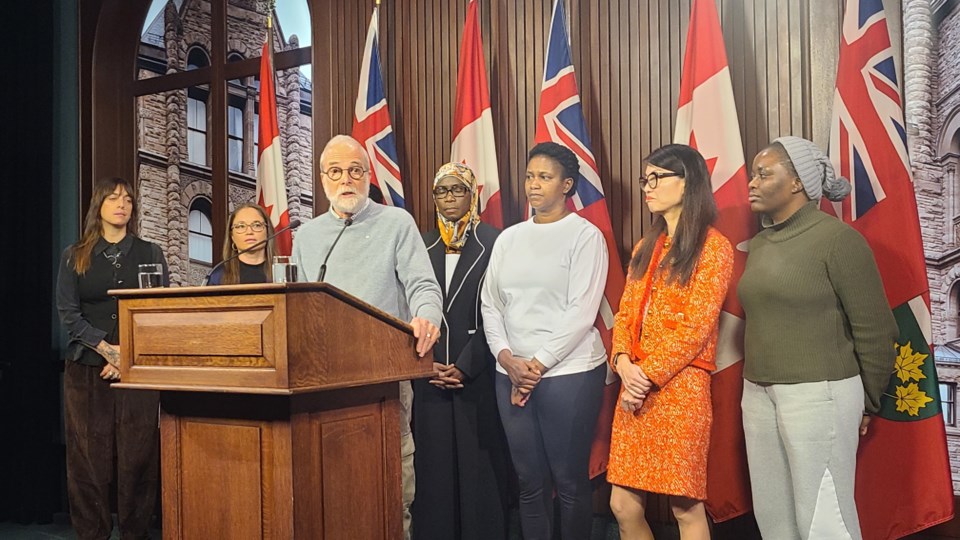Earlier this month, Premier Doug Ford promised that if he uses the notwithstanding clause to allow municipalities to evict homeless encampments when there are no shelter spaces or other housing available, the province is "going to make sure we find proper shelter for these people."
The premier didn't elaborate on how the government would carry out this promise, and organizations that run homeless and women's shelters say it will be impossible for Ford to find housing for that many people on short notice.
"Logistically, it is not possible to provide indoor spaces for every single resident that is in an encampment right now in Toronto," said Savhanna Wilson, executive director of the Toronto Alliance to End Homelessness.
According to Wilson, about 200 people are turned away from Toronto’s homeless shelters every night due to a lack of beds.
"Using the notwithstanding clause or evicting people from encampments, there just is nowhere for them to go. (Encampments are) not something we have a viable alternative for right now. We don't have enough housing and we don't have enough shelter beds."
Executive director of Sistering, Volletta Peters, agreed. During a press conference at Queen's Park, she said her women's shelter is also already over capacity, with at least 15 people sleeping on mats on the floor.
Women and other gender-diverse people displaced from encampments would likely show up at Sistering, Peters said, where they would have to be turned away.
"The solution is not shelters. The solution is affordable housing; long-term, affordable housing.”
Siu Mee Cheng, executive director of the Street Haven shelter said the province should be "focusing on introducing more housing, rather than trying to remove them forcibly from spaces. Ultimately, they have no other choice [but to live in encampments] at this point in time, because there's no supports from government."
University of Toronto social work professor Steve Lurie said there are ways for the province to start providing an alternative to encampments quickly. He recommended replicating University Health Network's modular supportive housing project on Dunn Avenue in Toronto, which is being set up to house frequent hospital patients without homes.
"[That was] executed in about five or six months. The city gave the land, there was funding available for both the servicing and the purchase of modular housing, and now 55 people are housed," noted Lurie.
"That's a small amount, but it's a big start, and I think if we could scale that across the city, we would certainly reduce human suffering."
Fifteen mayors in Ontario have — at the premier’s behest — asked him to use the notwithstanding clause to nullify a 2023 court decision barring municipalities from evicting homeless encampments when there is nowhere for people living there to go.
But more than 40 city councillors have signed another letter calling on those mayors to rescind that request and “support evidence-based solutions to homelessness and the Charter of Rights and Freedoms, to ensure the democratic will of our constituents and human rights are respected.”
The signatories of this latest letter come from 23 different communities, including six whose mayors called for the use of the notwithstanding clause: Cambridge, Chatham-Kent, Guelph, Niagara Falls, St. Catharines, and St. Thomas. The councillors claimed they were not consulted prior to their mayors sending the request.
Cambridge Mayor Jan Liggett told The Trillium that she had not sought her council’s approval before calling for the use of the notwithstanding clause, but was confident they supported her decision.
Former Toronto mayor, and the NDP's new municipal policy advisor, David Miller, said during a different press conference last week that mayors "shouldn't have the power to make unilateral decisions," and should restrict themselves to advocating for policy positions that their councils have approved.
Miller also said Ford's preference for dealing with mayors — like giving them strong mayor powers and cutting the size of Toronto City Council — are all a reflection of the premier's personality.
"He likes to do deals, and he likes to make decisions in private," said Miller, but mayors should "speak for their councils on matters that are decided."
"There's nothing wrong with the premier meeting with mayors, but we've seen what happens all too often with this kind of background deal-making, and it deeply troubles me and worries me.”




